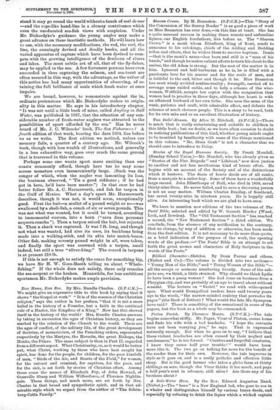Ecce Homo, Ecce Res. By Mrs. Rundle Charles. (S.P.C.K.)— We
might give an expressive title to this book by saying that it shows " the Gospel at work." " It is of the essence of the Christian religion," says the author in her preface, "that it is not a mere belief in the history of a Founder, but a faith in the continual rule of a Master, the Kingdom of a King." How has this showed itself in the history of the world ? Mrs. Rundle Charles answers by taking in succession the ages of Christian history, as they are marked by the relation of the Church to the world. These are the ages of conflict, of the solitary life, of the great development of doctrine, of monasticism, of the Preaching orders, represented respectively by the Martyrs, the Hermits, the great Bishops, the Monks, the Friars. The same subject is then in Part II. regarded from a different aspect. What Christianity, or, as it would be better put, what Christ, working by those who have best caught his spirit, has done for the people, for children, for the poor kinsfolk of man, " Birds of the Air, and Beasts of the Field," for woman, for the outcast and criminal, for captives, for the poor, and for the sick, is set forth by stories of Christian effort. Among these come the names of Elizabeth Fry, of John Howard, of Granville Sharp and William Wilberforce, of Florence Nightin- gale. These things, and much more, are set forth by Mrs. Charles in that broad and sympathetic spirit, and in that ad- mirable style which we expect from the author of "The Schon- berg-Cotta Family."


















































 Previous page
Previous page